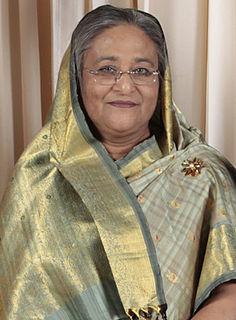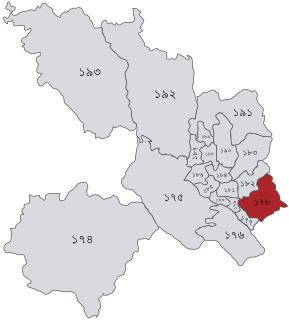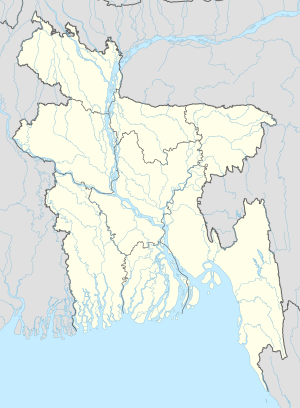
Dhaka, formerly known as Dacca, is the capital and largest city of Bangladesh. It is one of the largest and most densely populated cities in the world, with an population of 18.89 million people in the Greater Dhaka Area. Dhaka is the economic, political and cultural center of Bangladesh. It is one of the major and one of the biggest cities of South Asia, it is the largest city in Eastern South Asia and among the Bay of Bengal countries; and one of the largest cities among OIC countries. As part of the Bengal plain, the city is bounded by the Buriganga River, Turag River, Dhaleshwari River and Shitalakshya River. The city is located in an eponymous district and division.
The foreign relations share the Bangladeshi government's policies in its external relations with the international community. The country pursues a moderate foreign policy that places heavy reliance on multinational diplomacy, especially at the United Nations and World Trade Organization (WTO). Since independence in 1971, the country has stressed its principle of "Friendship towards all, malice towards none" in dictating its diplomacy. As a member of the Non-Aligned Movement, Bangladesh has tended to not take sides with major powers. Since the end of the Cold War, the country has pursued better relations with regional neighbours.
Biman Bangladesh Airlines, commonly known as Biman, pronounced, is the national flag carrier of Bangladesh, having its main hub at Hazrat Shahjalal International Airport in Dhaka with its flights also operating from its secondary hubs at Shah Amanat International Airport in Chittagong as well as Osmani International Airport in Sylhet. The airline provides international passenger and cargo services to multiple destinations and has air service agreements with 42 countries. The headquarters of the airline, Balaka Bhaban, is located in Kurmitola, in the northern part of Dhaka. Annual Hajj flights; transporting tourists, migrants and non-resident Bangladeshi workers; and the activities of its subsidiaries form an integral part of the corporate business of the airline. Bangladesh's air transport sector, which is experiencing an 8% annual growth rate thanks to a large number of outbound tourists, domestic tourists and non-resident Bangladeshi travellers, is very competitive with stiff competition among a number of domestic Bangladeshi private airlines as well as Biman.

Sheikh Hasina Wazed is a Bangladeshi politician serving as the 10th Prime Minister of Bangladesh, having held the office since January 2009. She is the longest serving prime minister in the history of Bangladesh.

The Bangladesh National Football Team is the national team of Bangladesh controlled by the Bangladesh Football Federation. It is a member of the Asian Football Confederation, and became a member of FIFA in 1974 even though the Bangladesh Football Federation was first founded in 1972. Bangladesh was elected as a member of the AFC Executive Committee 1982–86 and 1998–02. The current Executive Committee was elected democratically, under an AFC approved constitution and direct supervision of FIFA & AFC, in April 2008.

Mashrafe Bin Mortaza (Bengali: মাশরাফি বিন মর্তুজা pronunciation ; is a Bangladeshi international cricketer, current captain of the One Day Internationals for Bangladesh national cricket team and member of the parliament Jatiya Sangsad from Narail-2. He also captained Bangladesh in Twenty20 Internationals. He broke into the national side in late 2001 against Zimbabwe and represented Bangladesh before having played a single first-class match. Mortaza captained his country in one Test and seven One Day Internationals between 2009 and 2010, however injury meant he was in and out of the side and Shakib Al Hasan was appointed captain in Mortaza's absence. Mortaza used to be considered one of the fastest bowlers produced by Bangladesh, previously bowling in the mid-135s-145s km/h in the 2000s, and regularly opens the bowling. He is a useful lower-middle order batsman, with a first-class century and three Test half centuries to his name. Mortaza's career has been hampered by injuries and he has undergone a total of ten operations on his knees and ankles.

The Ninth National Parliamentary Elections 2008 were held in Bangladesh on 29 December 2008. The two main parties in the election were the Bangladesh Nationalist Party (BNP), led by Khaleda Zia, and the Bangladesh Awami League Party, led by Sheikh Hasina. The Bangladesh Awami League Party formed a fourteen-party Grand Alliance including Ershad's Jatiya Party, while the BNP formed a four-party alliance which included the Islamist party Jamaat-e-Islami. The election was originally scheduled for January 2007, but it was postponed by a military-controlled caretaker government for an extended period of time.

The Asiatic Society of Bangladesh was established as the Asiatic Society of Pakistan in Dhaka in 1952, and renamed in 1972. Ahmed Hasan Dani, a noted historian and archaeologist of Pakistan played an important role in founding this society. He was assisted by Muhammad Shahidullah, a Bengali linguist. The society is housed in Nimtali locality of Old Dhaka.

British Bangladeshis are people of Bangladeshi origin who have attained citizenship in the United Kingdom, through immigration and historical naturalisation. During the 1970s, large numbers of Bangladeshis immigrated to the UK, primarily from the Sylhet Division. The largest concentration live in east London boroughs, such as Tower Hamlets. This large diaspora in London leads people in Bangladesh to refer to British Bangladeshis as "Londonis".

Radhikapur is a railway station in Uttar Dinajpur district in the Indian state of West Bengal. It is a defunct rail transit system on the Bangladesh-India border and is an India-Bangladesh land border checkpoint.

Biral is a border railway station in Bangladesh, situated in Dinajpur District, in Rangpur Division. It is a defunct railway transit point on the Bangladesh-India border and is an India-Bangladesh land border checkpoint.

Sylhet-4 is a constituency represented in the Jatiya Sangsad of Bangladesh since 2008 by Imran Ahmad of the Awami League.

Dhaka-5 is a constituency represented in the Jatiya Sangsad of Bangladesh since 2008 by Habibur Rahman Mollah of the Awami League.

Mymensingh-7 is a constituency represented in the Jatiya Sangsad of Bangladesh since 2019 by Ruhul Amin Madani of the Awami League.

Dhaka-8 is a constituency represented in the Jatiya Sangsad of Bangladesh since 2008 by Rashed Khan Menon of the Workers Party of Bangladesh.

Dhaka-9 is a constituency represented in the Jatiya Sangsad of Bangladesh since 2008 by Saber Hossain Chowdhury of the Awami League.
Comilla-9 is a constituency represented in the Jatiya Sangsad of Bangladesh since 2008 by Tazul Islam of the Awami League.

















